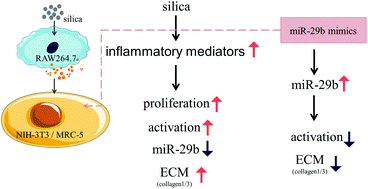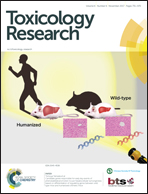MicroRNA-29b inhibits supernatants from silica-treated macrophages from inducing extracellular matrix synthesis in lung fibroblasts
Abstract
Silicosis is pathologically characterized by diffused pulmonary fibrosis and abundant deposition of extracellular matrix (ECM) components. The ECM is mainly secreted by myofibroblasts which are the activated state of fibroblasts. MicroRNA-29b (miR-29b) is one of the well-known microRNAs involved in fibrosis, but its roles in silicosis have not been specified. In this study, we hypothesized that miR-29b might play a protective role in the progression of silicosis. MTT assay, qRT-PCR, immunofluorescence and western blotting were applied. The results demonstrated that the supernatants from silica-treated macrophages not only caused the proliferation of fibroblasts (NIH-3T3 and MRC-5) but were also involved in the down-regulation of miR-29b. Meanwhile they could induce fibroblast activation, increasing the expression of ECM components such as collagen1 and collagen3, in a silica dose-dependent manner. Furthermore, overexpression of miR-29b by transfecting mimics markedly reduced the expression of ECM components and inhibited ECM synthesis. These findings indicate that miR-29b inhibits the supernatants from silica-treated macrophages from inducing extracellular matrix synthesis, thus miR-29b might have a strong anti-fibrotic capacity in silicosis and serve as a potential therapeutic agent for the treatment.



 Please wait while we load your content...
Please wait while we load your content...